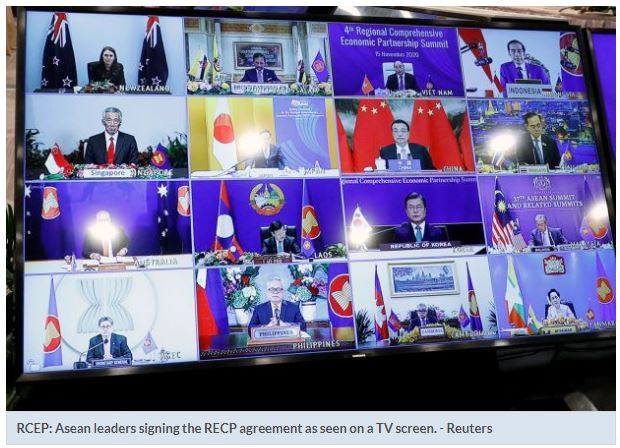Impact of RCEP on Malaysia: Gain or pain?
FOLLOWING the signing of the Regional Comprehensive Economic Partnership (RCEP), doors will soon open to attract more investments and swell Malaysia’s trade with partnering countries.
Almost 60% of Malaysia’s trade involve RCEP members and around 56% of Malaysia’s exports go towards the countries covered by the RCEP, given that Asean’s 10 members are Malaysia’s top trading partners (58% of total trade in 2019; exports share:56.4%; imports share:60.0%).
Malaysia’s open trade position will be greatly enhanced by increased market integration, reduced trade barriers and enhanced trade facilitation.
Malaysia stands to benefit in terms of geographical location (market access) of participating countries, supported by better trade facilitation and lower transaction costs for businesses and investors.
RCEP will provide Malaysian companies and consumers with increased commercial opportunities and partnerships with other RCEP members.
Foreign investments in Malaysia are expected to support Malaysian businesses by giving them access to capital and the technology and expertise of overseas partners.
The RCEP would provide growing opportunities for foreign companies and domestic companies in positioning Malaysia as a growing hub for economic activities, and be part of the growing global value chain activities.
Streamlining all Asean +1 FTAs into one single agreement allows access to almost 50% of global market through a single agreement. The improved connectivity will also see Malaysia gain from other economic sectors such as
travel, tourism, hospitality and aviation industry.
The trade deal not only gives consumers wide choices of goods and services at competitive prices but also for manufacturers and suppliers, they have an
opportunity to obtain good quality and competitively priced raw materials as well as wider scope for accumulation under the rules of origin’s (ROO) calculation.
Companies specialising in industries like telecommunications, banking and finance, and consultancy will benefit from enhanced cooperation.
A model simulation suggests that due to better access to large RCEP markets the most dynamic export growth will be experienced by the food and beverages industry, chemical and chemical products, rubber products, plastic products as well as machinery and equipment.
Textiles and wearing apparels will be dampened by low-cost competitors such as Vietnam while the timber and timber products industry too face competition from the participating countries. RCEP is expected to complement Asean’s efforts in becoming a single production base, thus ensuring that Malaysia would be on the investment radar of investors.
Malaysia remains a good investment location for both domestic and global investors and will continue to be given its proactive economic policies, a highly diversified economy and multilingual workforce, coupled with good
infrastructure and connectivity as well as strategic location.
What’s more important is to maintain an investment climate that is politically and economically stable as well as a transparent, business-friendly legal and regulatory environment to attract more foreign direct investment (FDI) from RCEP partnering countries.
In 2019, Asean’s investment of RM28.6bil made up 20.6% of total investment in Malaysia, followed by Japan (14.6%), and China (2.9%). With digitalisation and e-commerce delivering more trade and services, Malaysian companies, especially SMEs must continue to step up the deployment digital technology and e-trade platform to have a wider market reach.
Like other trade agreements, increasing market liberalisation and step up competition in the home base market place, Asean market and also in partnering countries’ market will pose challenges to some domestic sectors and SMEs in terms of costs and products’ competitiveness and also the companies’ capability to produce high quality and standard products and services in international markets.
Building a healthy, competitive business environment can
increase innovation, efficiency, and championship.
Overall, various studies have indicated that RECP is expected to generate a net positive effect on Malaysia with a net increase in GDP between 0.8% and 1.7%, while increases in exports are expected to remain substantial at 24.4%.
This is the final of a two-part series on the RCEP. Lee Heng Guie is the executive director of the Socio-Economic Research Centre. Views expressed here are his own.
Source: https://www.thestar.com.my/business/business-news/2020/11/18/insight—impact-of-rcep-on-malaysia-gain-or-pain


 Thailand
Thailand





